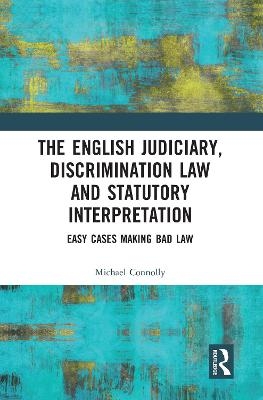
The Judiciary, Discrimination Law and Statutory Interpretation
Easy Cases Making Bad Law
Seiten
2020
Routledge (Verlag)
978-0-367-58623-2 (ISBN)
Routledge (Verlag)
978-0-367-58623-2 (ISBN)
This book examines these cases from the perspective of statutory interpretation, the judge’s primary function. The scrutiny finds the judgments technically flawed, overcomplicated, excessively long, and often unduly restrictive. As such, this book explains how the cases should have been resolved .
In 1856, the US Supreme Court denied Dred Scott, now free of slavery, his Constitutional rights, solely because he was black. According to the Court, when the Constitution was drafted, some 60 years earlier, its authors would not have intended that ‘a subordinate and inferior class of beings’ qualified as citizens of the United States. Thus, the meaning of language drafted over half a century before was frozen in time.
This case, perhaps more than any other, demonstrates that the matter of statutory interpretation is critical, technical, and, sometimes, highly emotive. The case is not a mere nugget from history to indulge our disgust with values of another age, and with it a satisfaction of our progress to today’s higher moral ground. It is the unfortunate case that the senior courts of England continue to produce highly contentious interpretations of our equality and discrimination laws.
This book examines these cases from the perspective of statutory interpretation, the judge’s primary function. The scrutiny finds the judgments technically flawed, overcomplicated, excessively long, and often unduly restrictive. As such, this book explains how the cases should have been resolved – using conventional methods of interpretation; this would have produced simpler, technically sound judgments. Rather like the case of Dred Scott, these were easy cases producing bad law.
In 1856, the US Supreme Court denied Dred Scott, now free of slavery, his Constitutional rights, solely because he was black. According to the Court, when the Constitution was drafted, some 60 years earlier, its authors would not have intended that ‘a subordinate and inferior class of beings’ qualified as citizens of the United States. Thus, the meaning of language drafted over half a century before was frozen in time.
This case, perhaps more than any other, demonstrates that the matter of statutory interpretation is critical, technical, and, sometimes, highly emotive. The case is not a mere nugget from history to indulge our disgust with values of another age, and with it a satisfaction of our progress to today’s higher moral ground. It is the unfortunate case that the senior courts of England continue to produce highly contentious interpretations of our equality and discrimination laws.
This book examines these cases from the perspective of statutory interpretation, the judge’s primary function. The scrutiny finds the judgments technically flawed, overcomplicated, excessively long, and often unduly restrictive. As such, this book explains how the cases should have been resolved – using conventional methods of interpretation; this would have produced simpler, technically sound judgments. Rather like the case of Dred Scott, these were easy cases producing bad law.
Dr Michael Connolly is Senior Lecturer at the University of Portsmouth, UK.
Table of authorities
Preface
1 INTRODUCTION
2 COMMON TOOLS OF STATUTORY INTERPRETATION
3 AN INTRODUCTION TO THEORIES AND AIMS OF DISCRIMINATION LAW
4 THE COMMON LAW AND EQUALITY
5 THE BENIGN MOTIVE ‘DEFENCE’ AND DIRECT DISCRIMINATION
6 THE BENIGN MOTIVE ‘DEFENCE’ AND VICTIMISATION
7 VICTIMISATION AND CONTEMPT OF COURT
8 PROBLEMS WITH INDIRECT DISCRIMINATION
9 DISABILITY-RELATED DISCRIMINATION
10 CONCLUSION
Bibliography
Index
| Erscheinungsdatum | 01.07.2020 |
|---|---|
| Verlagsort | London |
| Sprache | englisch |
| Maße | 156 x 234 mm |
| Gewicht | 453 g |
| Themenwelt | Recht / Steuern ► Allgemeines / Lexika |
| Recht / Steuern ► Arbeits- / Sozialrecht ► Arbeitsrecht | |
| Recht / Steuern ► Arbeits- / Sozialrecht ► Sozialrecht | |
| Recht / Steuern ► EU / Internationales Recht | |
| ISBN-10 | 0-367-58623-1 / 0367586231 |
| ISBN-13 | 978-0-367-58623-2 / 9780367586232 |
| Zustand | Neuware |
| Informationen gemäß Produktsicherheitsverordnung (GPSR) | |
| Haben Sie eine Frage zum Produkt? |
Mehr entdecken
aus dem Bereich
aus dem Bereich
mit Wahlordnung | Handkommentar
Buch | Hardcover (2024)
Franz Vahlen (Verlag)
95,00 €
Buch | Softcover (2025)
dtv Verlagsgesellschaft
14,90 €
Tarifrecht öffentlicher Dienst : Textausgabe
Buch | Softcover (2024)
dtv Verlagsgesellschaft
23,90 €


